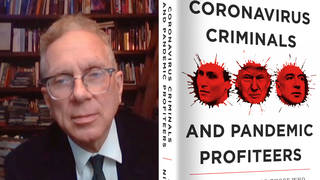
Guests
- Michael MooreAcademy Award-winning documentary filmmaker and activist. His new memoir is called Here Comes Trouble: Stories from My Life.
Healthcare costs for insured working Americans continue to rise, with premiums increasing nine percent for family plans over the past year. In this part of our interview with filmmaker and author Michael Moore, he discusses how health insurers have used the funds they receive from premiums to try to undermine their critics, including Moore himself. A health insurance company whistleblower, Wendell Potter, previously revealed in a Democracy Now! interview how industry executives plotted to undermine Moore’s 2007 film “SiCKO,” which took on the for-profit U.S. healthcare system. [includes rush transcript]
Transcript
AMY GOODMAN: As we talk about life-and-death issues, I wanted to slightly switch gears slightly, though, Michael, with SiCKO_, because you were taking on this healthcare issue early on. As a filmmaker, your work has angered a lot of powerful people. I want to go to a clip of my cliff”>interview last year with the former healthcare industry spokesperson, Wendell Potter. He was, what, the spokesperson for CIGNA and for Humana—one, first, Humana, then CIGNA. He worked for years. And I asked Wendell Potter how exactly the industry attacked and attempted to discredit SiCKO, your film.
WENDELL POTTER: One key component was to fund a front group, and that is something that I write about quite a bit in the book, about how special interests, and the insurance industry, in particular, will use premium dollars to funnel thousands and thousands, if not millions, of dollars to big PR firms to set up fake grassroots organizations—astroturf, as we call it—and front groups. And in this case, there was a front group that was set up called Health Care America, and the sole purpose for it to be set up was to attack Michael Moore and to attack the notion of a single-payer system in this country.
AMY GOODMAN: That was Wendell Potter. The front page today of the New York Times, “The cost of health insurance this year rose more steeply than in previous years, outstripping wages and adding uncertainty about the pace of growing costs.” Headline: “Health Insurers Push Premiums Sharply Higher.” How you were targeted—I mean, it’s, I guess, why you’ve got these ex-Navy SEALs around you—but talk about it, the significance. I mean, you’re at Cannes. It’s supposed to be some big art festival celebrating the greatest in film, and there the industry is, too.
MICHAEL MOORE: Yeah, they also—he, himself, actually admitted to flying to the little town that I live—where I live in northern Michigan, and to essentially spy on me. And as he said, you know, that their goal, in spending the hundreds of thousands, maybe even millions, of dollars, to stop me and stop my film, that they decided that they would stop at nothing, even if it meant, as they said, I hope figuratively, if it meant “pushing me off a cliff.” Those were his words.
You know, I knew that sooner or later some people in corporate America would start to come forward, because of the attacks I’ve had to endure over the years, the sort of—the things that are put out on me, it’s just amazing. And now, in his revelation of how—that they invented a front group and gave it an official-sounding name. Any time you hear anything about me of a negative nature, you should automatically assume somebody is behind that. And that’s not your paranoia at work. He just admitted that that’s—that the health insurance industry and the pharmaceutical industries spent a lot of money. I mean, the pharmaceutical companies, those poor [bleep], they were like—they had no idea, first of all. The film really wasn’t about them. It was more about the health insurance companies, but they spent so much money. I got—
AMY GOODMAN: Because they thought it was going to be about them.
MICHAEL MOORE: They thought it was gong to be about the drug companies, and so they—people who worked at these drug companies would send me these internal memos, where—Pfizer had a Michael Moore hotline, where, like, if I showed up at any of their regional offices, they were to call New York on this direct line. That one drug company hired a Michael Moore actor, a look-alike, God forbid, who then came in and did role playing with executives for, just in case my camera crew nabbed them, how to respond to me properly.
You know, they did—I talk about in this book, there’s someone who did work for the Bush administration, also came forward and told me about Rove’s reaction to Fahrenheit 9/11. And they were so afraid that this movie would be Bush’s undoing at the polls, and so they immediately concocted their campaign to go after me and the film. They did polling around it. They were very worried, and they decided to spend a lot of time and money on Michael Moore.
AMY GOODMAN: They said they were going to destroy you.
MICHAEL MOORE: Yes, that is—that’s right. So, OK, as he said, bring it on. I mean, what else am I going to—you know.












Media Options